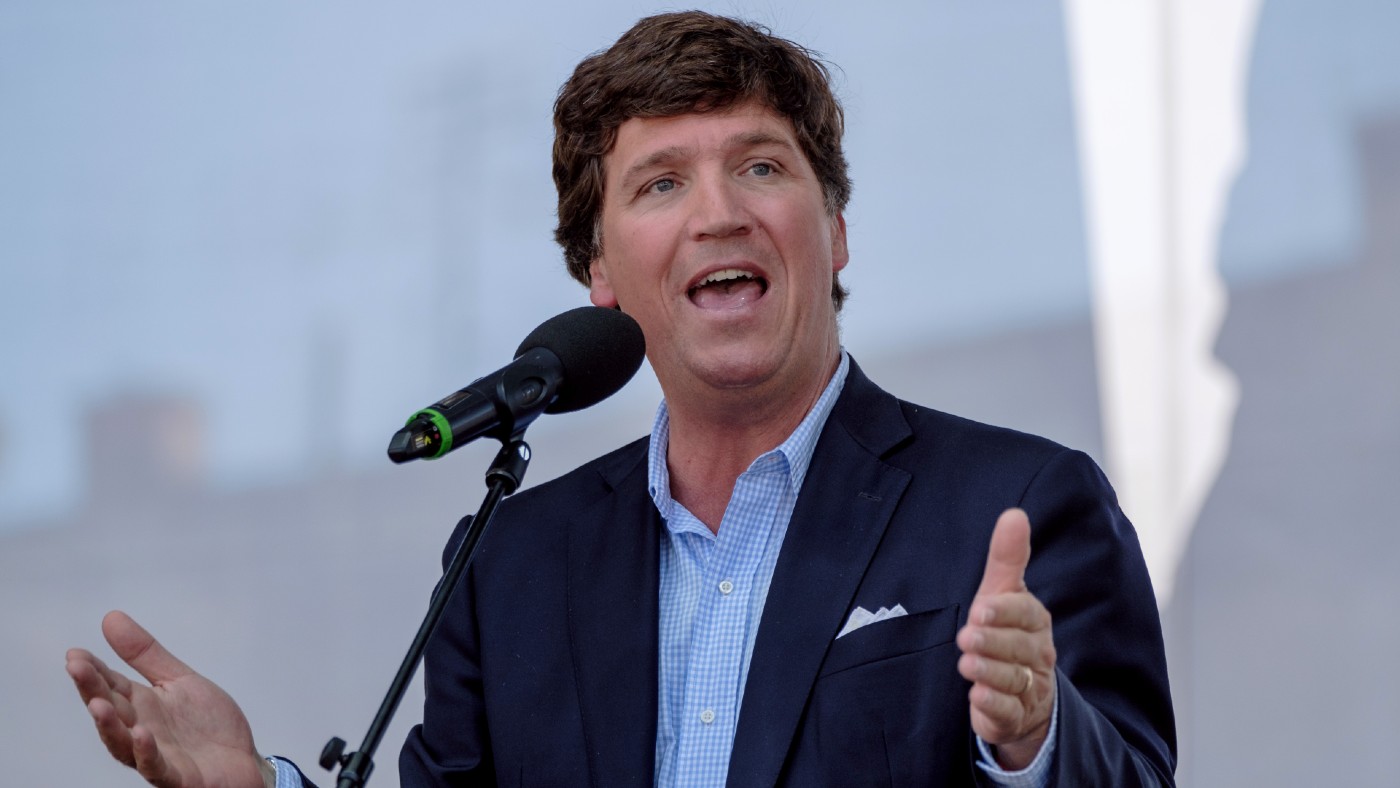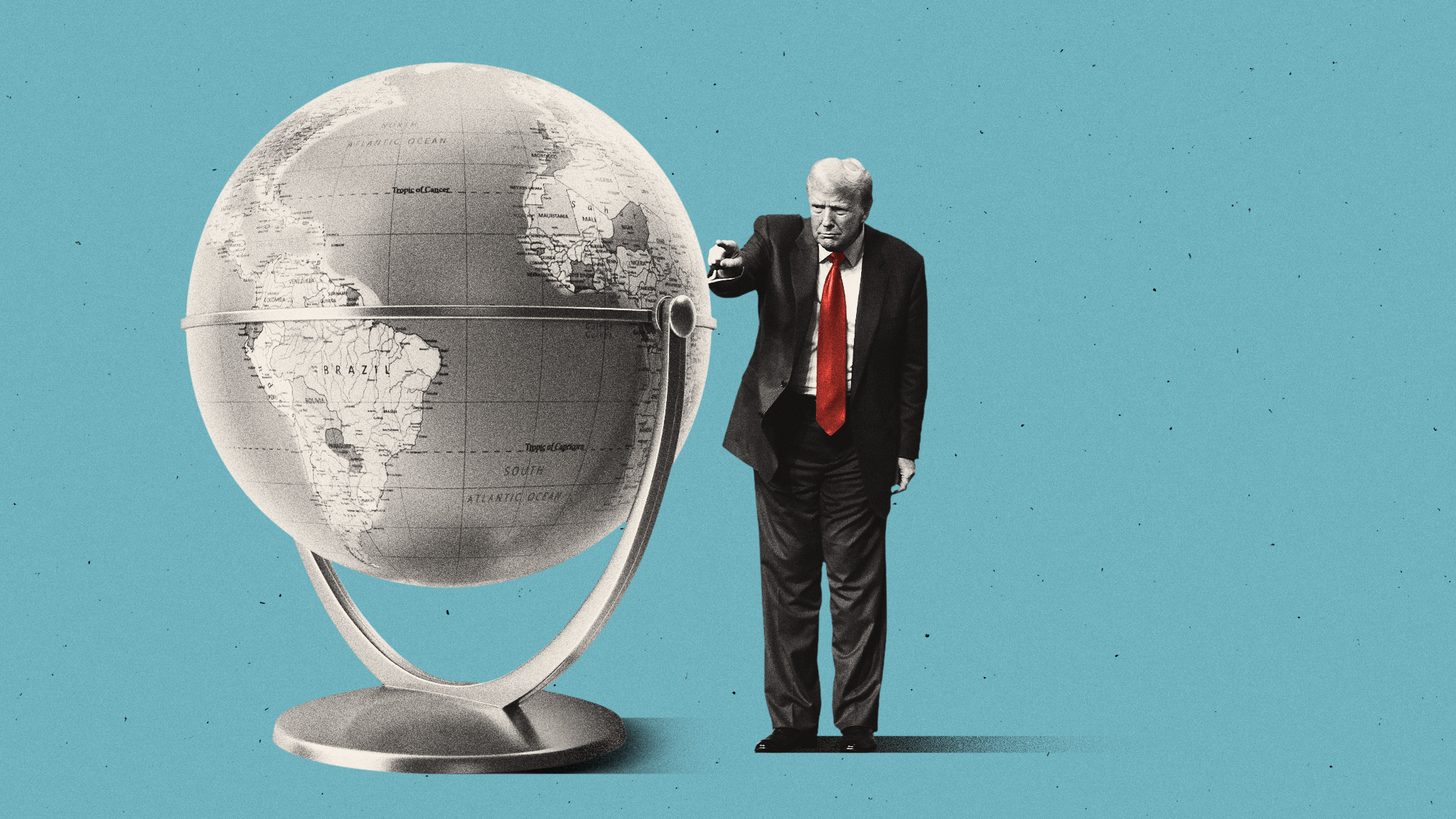‘I’m with Vlad’: who are the US conservatives praising Putin?
Tucker Carlson has repeatedly played down Russia’s aggression – and he’s not alone

A free daily email with the biggest news stories of the day – and the best features from TheWeek.com
You are now subscribed
Your newsletter sign-up was successful
Eighty years ago, when Hitler was invading his neighbours in Europe, he found an ally in the US, said William Saletan in The Bulwark (Washington DC). That ally was Charles Coughlin, a popular radio host who defended the Nazis and opposed America’s entry into the War, arguing that the movement to enlist the US was a Jewish conspiracy. “Today, a new demagogue has taken up Coughlin’s mantle: Fox News host Tucker Carlson.”
The leading conservative pundit of the moment, he had previously – repeatedly – played down Russia’s aggression, insisting that it was no business of the US. This from the same man who cried that Canada had “cancelled democracy” by arresting a few anti-vaccine protesters, said Max Boot in The Washington Post.
Alas, Carlson is not alone. His views are echoed by many other “America Firsters”, including Donald Trump, who was still praising Vladimir Putin as Russian troops moved into Ukraine last week, hailing his moves as “genius”.
The Week
Escape your echo chamber. Get the facts behind the news, plus analysis from multiple perspectives.

Sign up for The Week's Free Newsletters
From our morning news briefing to a weekly Good News Newsletter, get the best of The Week delivered directly to your inbox.
From our morning news briefing to a weekly Good News Newsletter, get the best of The Week delivered directly to your inbox.
These conservatives might as well have pinned “I’m-with-Vlad” badges onto their lapels, said David Corn in Mother Jones (San Francisco). Because they’re consumed with hatred for Joe Biden, and he’s confronting Putin, they feel compelled to defend Putin and “trash-talk” Biden – insisting that Trump would have done a far better job of managing this crisis.
That’s an absurd claim when you consider the record of Trump’s craven interactions with the Russian leader, and the ways his divisive approach undermined Nato. When the Kremlin mounted a covert attack on the US election in 2016, Trump didn’t kick up a fuss. He actually encouraged Russian hackers to target Hillary Clinton. And he has barely said a critical word against Putin since.
Trump’s praise of Putin’s “savvy” tactics in Ukraine was shameful, said Rich Lowry in the New York Post. But he may have been right in asserting that the Russian assault on Ukraine “never would have happened” while he was president. It’s certainly notable that Putin’s two Ukraine invasions – in 2014 and today – occurred during the administrations of Trump’s Democratic predecessor and successor. “Trump’s unpredictability and sensitivity to slights and threats surely would have made Putin think twice before trying his current gambit.”
For all his warm words, Trump pursued a reasonably tough approach to Moscow during his administration. He armed Ukraine, which the Obama administration had refused to do; he inveighed against the Nord Stream 2 pipeline to Germany; and pushed Europeans to spend more on defence – “all of which were unwelcome to Putin”.
A free daily email with the biggest news stories of the day – and the best features from TheWeek.com
There is an argument that people should put partisan politics aside at a time like this, said Dan McLaughlin in National Review (New York). I don’t agree: there’s nothing wrong with calling out leaders’ failure to deal adequately with evil men. Our histories of WWII are “full of criticisms of people other than Hitler, without for an instant relieving Hitler of his moral responsibility”.
But the sad truth is that few US politicians emerge well from our dealings with Putin, dating back to his war with Georgia in 2008. One who does come out well is the Republican Mitt Romney. While running for president back in 2012 he identifed Russia as “without question, our number one geopolitical foe”. He was much mocked for doing so. “The 1980s are now calling to ask for their foreign policy back,” Barack Obama told him, “because the Cold War has been over for 20 years.” Romney referred to that line in his statement last week about the Ukraine crisis, saying, “The ‘80s called and we didn’t answer.” Romney is surely “entitled to his I-told-you-so”.
-
 Switzerland could vote to cap its population
Switzerland could vote to cap its populationUnder the Radar Swiss People’s Party proposes referendum on radical anti-immigration measure to limit residents to 10 million
-
 Political cartoons for February 15
Political cartoons for February 15Cartoons Sunday's political cartoons include political ventriloquism, Europe in the middle, and more
-
 The broken water companies failing England and Wales
The broken water companies failing England and WalesExplainer With rising bills, deteriorating river health and a lack of investment, regulators face an uphill battle to stabilise the industry
-
 Munich Security Conference: a showdown between Europe and Trump?
Munich Security Conference: a showdown between Europe and Trump?Today’s Big Question Report suggests European leaders believe they can no longer rely on the US for military support – but decoupling is easier said than done
-
 New START: the final US-Russia nuclear treaty about to expire
New START: the final US-Russia nuclear treaty about to expireThe Explainer The last agreement between Washington and Moscow expires within weeks
-
 Would Europe defend Greenland from US aggression?
Would Europe defend Greenland from US aggression?Today’s Big Question ‘Mildness’ of EU pushback against Trump provocation ‘illustrates the bind Europe finds itself in’
-
 Greenland, Colombia, Cuba: where is Donald Trump eyeing up next?
Greenland, Colombia, Cuba: where is Donald Trump eyeing up next?Today's Big Question Ousting Venezuela’s leader could embolden the US administration to exert its dominance elsewhere
-
 Did Trump just end the US-Europe alliance?
Did Trump just end the US-Europe alliance?Today's Big Question New US national security policy drops ‘grenade’ on Europe and should serve as ‘the mother of all wake-up calls’
-
 Trump peace deal: an offer Zelenskyy can’t refuse?
Trump peace deal: an offer Zelenskyy can’t refuse?Today’s Big Question ‘Unpalatable’ US plan may strengthen embattled Ukrainian president at home
-
 Vladimir Putin’s ‘nuclear tsunami’ missile
Vladimir Putin’s ‘nuclear tsunami’ missileThe Explainer Russian president has boasted that there is no way to intercept the new weapon
-
 Russia’s war games and the threat to Nato
Russia’s war games and the threat to NatoIn depth Incursion into Poland and Zapad 2025 exercises seen as a test for Europe